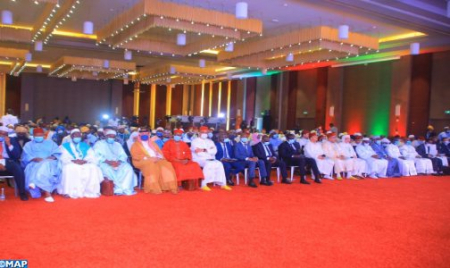
Ulemas (theologians) from several African countries have commended King Mohammed VI for his religious leadership in the continent and for his stewardship in promoting Afro-African cooperation.
This came during the international symposium on interreligious dialogue co-organized, from February 23 to 25 in Abidjan, by the Mohammed VI Foundation of African Ulemas and the Superior Council of Imams, Mosques and Islamic Affairs of Côte d’Ivoire (COSIM).
The King’s religious leadership was highlighted as a bulwark against extremism in the continent and his development initiatives were hailed as serving Afro-African cooperation.
“A worthy son of Africa, His Majesty King Mohammed VI favors Afro-African cooperation in his development offensives. The Ivorian people can testify to this,” said COSIM President, Cheikhoul Aïma Ousmane Diakité, in a speech before the symposium.
Ousmane Diakité expressed heartfelt thanks to the King, the Commander of the Faithful, for the creation of the Mohammed VI Foundation of African Ulemas and for having authorized the opening of sections of the foundation in several African countries, including in Côte d’Ivoire.
Speaking of the choice of Côte d’Ivoire to host the international symposium on interreligious dialogue, he noted that “as in most African countries, there already exists here an informal tradition of interreligious dialogue, through the peaceful coexistence of communities of different beliefs. It is the dialogue of life where women and men, in their religious diversity, share their pains and their joys on a daily basis. In the street, at work, at school, everyone recognizes the other as his fellow man, despite the difference in belief.
Noting, however, that the existence of this informal tradition of dialogue suffers from shortcomings, he argued that the holding of this international symposium will allow participants to refine, over three days, national strategies. “Without a doubt, at the end of the exchanges, the participants will make religion a leaven of the history of our different peoples,” he noted.
For his part, Cheikh Ndiaye Salehou, President of the Central African Republic section of the Mohammed VI Foundation of African Ulemas, expressed in a speech on behalf of the Ulemas of the Foundation, his sincere thanks and his immense gratitude to Amir Al-Mouminine, King Mohammed VI, for his action to protect common religious constants in Africa, through the Mohammed VI Foundation of African Ulemas.
This foundation has always advocated the paths of unity in Africa and contributed to the integration of the values of peace and coexistence of an Islam of the middle way, opposed to any attempt to spread the values of hatred and extremism, he said.
In the opinion of Cheikh Ndiaye Salehou, Africa, this great continent, bastion of languages, of diverse cultures and of a centuries-old history, needs more than ever today to establish a constructive dialogue, a preamble to rapprochement and to the cooperation of peoples, turning its back on dissension by returning to the pure sources of religion.
“Only this culture of dialogue and exchange is able to put an end to the excesses and extremisms which inevitably lead to resentment and violence,” he insisted.
The action of the Mohammed VI Foundation of African Ulemas is underpinned by the directives of its founder, King Mohammed VI, who constantly encourages the preservation of common religious constants, as well as openness to other religions and other civilizations, with the aim of establishing a platform for communication and exchange, hindering the paths of divergence and confrontation.
Placed under the theme “The eternal message of religions”, the Abidjan symposium, is meant to support the sustainability of peace in Africa through interfaith dialogue as well as the continuity of the eternal message of religions on peace in the world, in addition to opening channels for exchange and dialogue between Muslims and Christians.
The event is bringing together researchers and experts from all African backgrounds of Muslim and Christian faith, and more than 600 participants, including presidents and members of the 34 sections of the Mohammed VI Foundation of African Ulemas.
This three-day symposium will highlight by the adoption of the Abidjan Peace Declaration.
